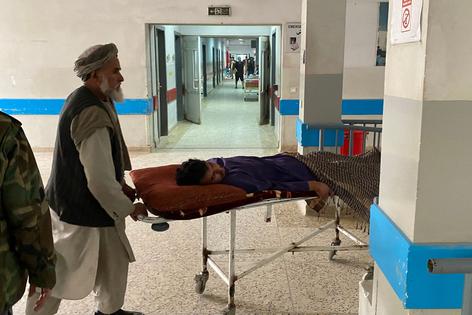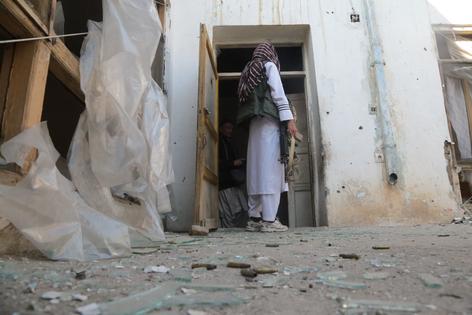A string of assassinations in Afghanistan point to ISIS-K resurgence – and US officials warn of possible attacks on American interests in next 6 months
Published in Business News
Since returning to power in Afghanistan in 2021, the Taliban have struggled to contain the Islamic State Khorasan province, or ISIS-K – the official Islamic State group affiliate operating in Afghanistan.
Now, a fresh wave of assassination attempts on top Taliban officials has rocked multiple regions across the country and prompted fears of the group’s potential to attack targets outside Afghanistan, including U.S. and Western interests.
On March 9, 2023, the Islamic State group claimed responsibility for a suicide bombing that killed Mohammad Dawood Muzammil, the Taliban governor of Balkh province in northern Afghanistan, along with two others. One day earlier, the group’s fighters carried out a targeted killing against the head of the water supply department in Afghanistan’s western Herat province. And most recently, on March 15, the group claimed a failed attack on a Taliban district governor in the eastern province of Nangarhar, a former ISIS-K stronghold.
ISIS-K seeks to advance the Islamic State group’s goal of creating a global caliphate based on its own interpretation of Islamic law.
As scholars who have studied ISIS-K for years, we know that the recent attacks are only a few in a long line of attacks the group has carried out or attempted in Afghanistan since forming in 2015.
ISIS-K has tried – often successfully – to kill government and military officials, media influencers, religious leaders and other civil society figures. The group is also responsible for the bombing that left 13 U.S. service members and scores of Afghans dead in August 2021, following the collapse of the former government and the U.S.-led withdrawal from Afghanistan.
Some of ISIS-K’s ambitious plots have failed. Notable examples include claimed attempts against NATO Secretary General Jens Stoltenberg and former U.S. Secretary of Defense James Mattis in 2017, former Afghanistan vice president Abdul Rashid Dostum in 2018, former Afghanistan president Ashraf Ghani in 2020 and former U.S. diplomat in Kabul Ross Wilson in 2021.
Despite both being Islamist organizations, ISIS-K and the Taliban are strategic rivals locked in a battle that has persisted since ISIS-K’s inception. Targeted assassinations of Taliban security and political officials, across multiple ranks and levels, have been a consistent feature of ISIS-K’s resurgence. The recent killings are simply a continuation of the group’s attack priorities.
Assassinations are a fundamental pillar of the Islamic State group’s insurgency doctrine, which is adopted by its affiliates and serves multiple purposes.
For one, they’re a way to retaliate against heavy losses. Just days before the latest string of attacks, ISIS-K threatened to amplify its violence after Taliban raids in January and February killed key Islamic State leaders and attack planners.
For another, assassinations can whittle away key leaders in the enemy’s ranks, as well as foreign influence. The latest issue of the Islamic State group’s weekly newsletter, Al-Naba, claimed that Gov. Muzammil was not only a significant player in the Taliban’s campaign against ISIS-K in Nangarhar, but that he was also acting on behalf of Iran. Countering actual or perceived foreign state influence in Afghanistan – even the lifesaving work of international humanitarian groups – has been a consistent feature of ISIS-K propaganda and violence.
In addition, assassinations of high-profile opponents serve to raise morale among fighters, prevent defections and boost recruitment. The ability to assassinate top Taliban leaders and commanders showcases ISIS-K’s strength to potential recruit, including from within the Taliban’s ranks.
Finally, high-profile attacks signal to the Islamic State’ group’s core leadership in Iraq and Syria that its affiliate in Afghanistan deserves continued support and investment. ISIS-K leaders have frequently sent letters to Islamic State group leadership boasting of their successful assassinations and other operations. After the attack on the Kabul airport in August 2021, ISIS-K received new cash payments from top Islamic State group leaders – either as a reward, investment or both.
How successful ISIS-K is in rebuilding its insurgency and replicating the caliphate model in Iraq and Syria will depend on a number of factors.
Most important is its continued ability to leverage its strategic alliances and rivalries. Partnering with other jihadist groups in the region helps ISIS-K sustain its capacity for violence. And accusing the Taliban of apostasy for accepting foreign investment and humanitarian aid from “infidel” or enemy governments – including China, the U.S., Iran, Turkey and others – helps distinguish ISIS-K’s own brand from its rivals. Targeting killings of such opponents further reinforces this distinction.
A strengthened ISIS-K insurgency in Afghanistan has direct consequences for U.S. and Western security interests. A February 2023 U.S. intelligence report warned of ISIS-K’s desire to attack the West. And on March 16, U.S. CENTCOM commander Gen. Michael Kurilla testified that ISIS-K will be able to attack American and Western interests outside Afghanistan in less than six months.
Whether or not this assessment is accurate, the recent claimed assassinations by ISIS-K are one of many indicators that point to its growing threat in Afghanistan – a threat that we believe the Taliban can’t take on alone.
This article is republished from The Conversation, an independent nonprofit news site dedicated to sharing ideas from academic experts. Like this article? Subscribe to our weekly newsletter.
Read more:
What is ISIS-K? Two terrorism experts on the group behind the deadly Kabul airport attack and its rivalry with the Taliban
A year after the fall of Kabul, Taliban’s false commitments on terrorism have been fully exposed
The authors do not work for, consult, own shares in or receive funding from any company or organization that would benefit from this article, and have disclosed no relevant affiliations beyond their academic appointment.















Comments